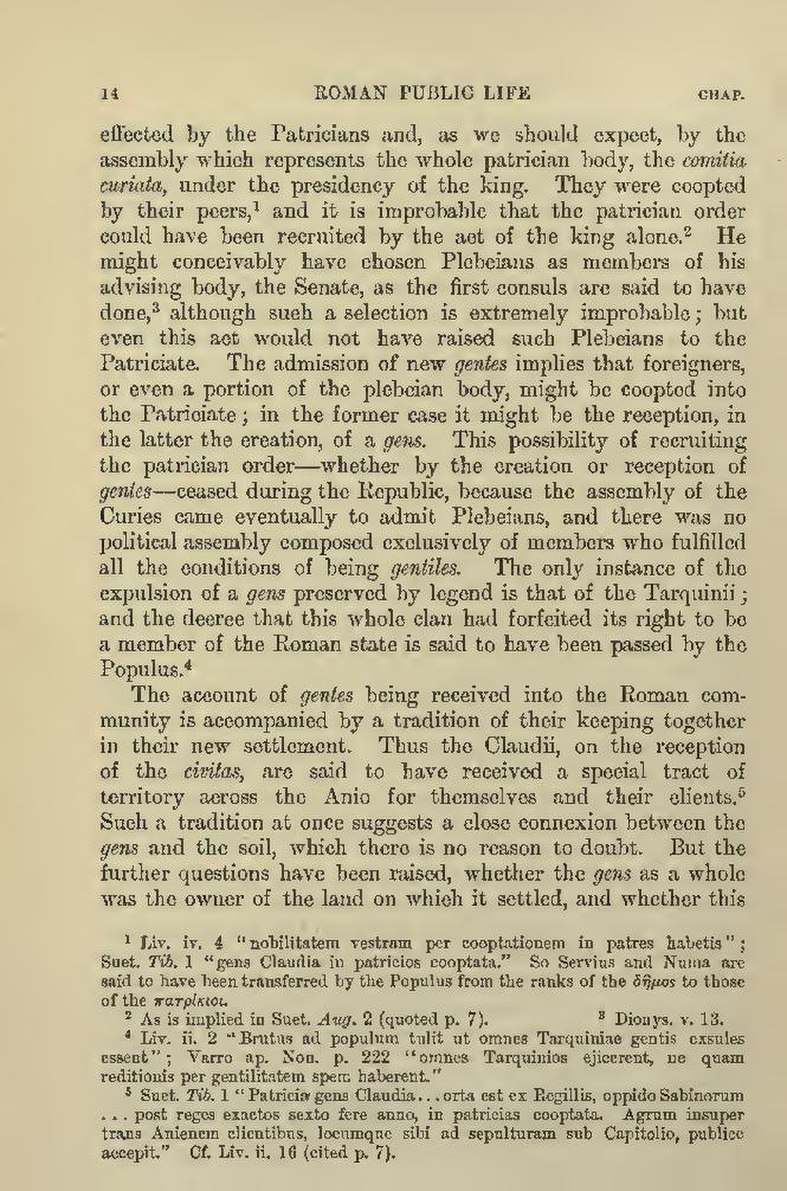effected by the Patricians and, as we should expect, by the assembly which represents the whole patrician body, the comitia curiata, under the presidency of the king. They were coopted by their peers,[1] and it is improbable that the patrician order could have been recruited by the act of the king alone.[2] He might conceivably have chosen Plebeians as members of his advising body, the Senate, as the first consuls are said to have done,[3] although such a selection is extremely improbable; but even this act would not have raised such Plebeians to the Patriciate. The admission of new gentes implies that foreigners, or even a portion of the plebeian body, might be coopted into the Patriciate; in the former case it might be the reception, in the latter the creation, of a gens. This possibility of recruiting the patrician order—whether by the creation or reception of gentes—ceased during the Republic, because the assembly of the Curies came eventually to admit Plebeians, and there was no political assembly composed exclusively of members who fulfilled all the conditions of being gentiles. The only instance of the expulsion of a gens preserved by legend is that of the Tarquinii; and the decree that this whole clan had forfeited its right to be a member of the Roman state is said to have been passed by the Populus.[4]
The account of gentes being received into the Roman community is accompanied by a tradition of their keeping together in their new settlement. Thus the Claudii, on the reception of the civitas, are said to have received a special tract of territory across the Anio for themselves and their clients.[5] Such a tradition at once suggests a close connexion between the gens and the soil, which there is no reason to doubt. But the further questions have been raised, whether the gens as a whole was the owner of the land on which it settled, and whether thisto those of the [Greek: patrikioi].]
- ↑ Liv. iv. 4 "nobilitatem vestram per cooptationem in patres habetis"; Suet. Tib. 1 "gens Claudia in patricios cooptata." So Servius and Numa are said to have been transferred by the Populus from the ranks of the [Greek: dêmos
- ↑ As is implied in Suet. Aug. 2 (quoted p. 7).
- ↑ Dionys. v. 13.
- ↑ Liv. ii. 2 "Brutus ad populum tulit ut omnes Tarquiniae gentis exsules essent"; Varro ap. Non. p. 222 "omnes Tarquinios ejicerent, ne quam reditionis per gentilitatem spem haberent."
- ↑ Suet Tib. 1 "Patricia gens Claudia . . . orta est ex Regillis, oppido Sabinorum . . . post reges exactos sexto fere anno, in patricias cooptata. Agrum insuper trans Anienem clientibus, locumque sibi ad sepulturam sub Capitolio, publice accepit." Cf. Liv. ii. 16 (cited p. 7).
